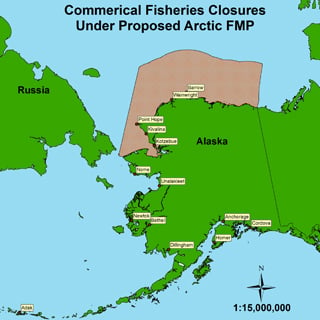Last Thursday, a U.S. federal fishery panel based in Seattle voted to restrict nearly 200,000 square nautical miles of American waters north of the Bering Strait from industrial fishing. The North Pacific Fishery Management Council made the move in response to concerns over global warming rather than overfishing. Melting ice has made the waters, which are located in the Chuchki and Beaufort Seas, more accessible to fishermen — and thus possible exploitation and overfishing. Oceana, an international marine conservation organization, observed that the closure is “among the largest-ever precautionary and preventative measures in fisheries management history.” Most efforts made to preserve marine resources, on the other hand, occur after a fish stock has already crashed.
The Anchorage Daily News condoned the closure, noting that it is best to protect the area, since so little is known about what the area’s resources hold. Although there are presently no commercial harvests in U.S. Arctic federal waters, pressure to fish in the areas is likely to increase as the ice melts. However, the new restriction can be overturned only if there is “scientific conclusion that a specific fishery and the ecosystem in general could tolerate commercial fishing.”
The proposal will be forwarded to the U.S. Department of Commerce for final approval. If approved, the restriction will benefit the State Department’s efforts to have similar environmental regulations passed by the Russian and Canadian governments to protect their own territorial waters in the Arctic. Representatives from the U.S. State Department sat in on the panel’s proceedings, demonstrating the increasing importance of the Arctic in international affairs.

Courtesy Oceana